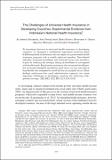The Challenges of Universal Health Insurance in Developing Countries: Experimental Evidence from Indonesia’s National Health Insurance
Author(s)
Banerjee, Abhijit; Finkelstein, Amy; Hanna, Rema; Olken, Benjamin A; Ornaghi, Arianna; Sumarto, Sudarno; ... Show more Show less
DownloadPublished version (746.1Kb)
Publisher Policy
Publisher Policy
Article is made available in accordance with the publisher's policy and may be subject to US copyright law. Please refer to the publisher's site for terms of use.
Terms of use
Metadata
Show full item recordAbstract
<jats:p> To investigate barriers to universal health insurance in developing countries, we designed a randomized experiment involving about 6,000 households in Indonesia who are subject to a government health insurance program with a weakly enforced mandate. Time-limited subsidies increased enrollment and attracted lower-cost enrollees, in part by reducing the strategic timing of enrollment to correspond with health needs. Registration assistance also increased enrollment, but increased attempted enrollment much more, as over one-half of households who attempted to enroll did not successfully do so. These findings underscore how weak administrative capacity can create important challenges in developing countries for achieving widespread coverage. (JEL D82, G22, H51, I13, I18, O15) </jats:p>
Date issued
2021Department
Massachusetts Institute of Technology. Department of EconomicsJournal
American Economic Review
Publisher
American Economic Association
Citation
Banerjee, Abhijit, Finkelstein, Amy, Hanna, Rema, Olken, Benjamin A, Ornaghi, Arianna et al. 2021. "The Challenges of Universal Health Insurance in Developing Countries: Experimental Evidence from Indonesia’s National Health Insurance." American Economic Review, 111 (9).
Version: Final published version